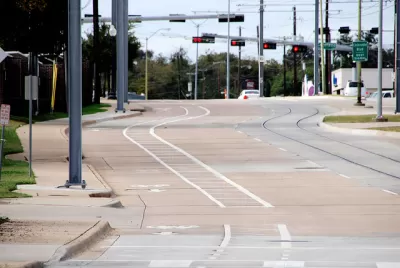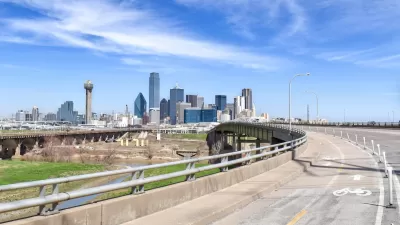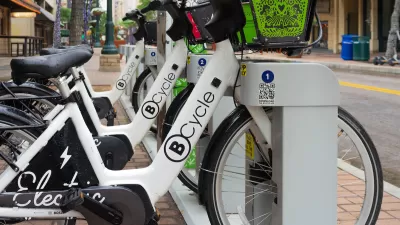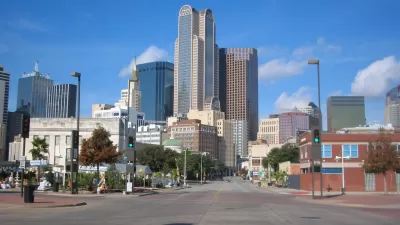As the Dallas City Council prepares to vote this month on a general fund budget, the future of bike lanes is not looking good.

Robert Wilonsky reports on the Dallas City Council’s upcoming vote on a $1.35-billion general fund budget. This is an opportunity, says Wilonsky, to push forward what was outlined in the 2011 Dallas Bike Plan:
Right now, the city of Dallas spends just $500,000 every year on bike lanes, which does not stretch very far. City Manager T.C. Broadnax's budget proposes to double that in the coming fiscal year to a just-barely-less-lousy $1 million, and then to double that in two years so that, finally, we might inch closer to the 840-mile-long finish line promised by the bike plan.
Unfortunately, it looks like the council is more inclined to vote to eliminate funding for bike lanes, along with outside offices and additional staff support for council members. This is part of a plan to redirect funds to raises to keep police, firefighters, and paramedics from leaving for higher salaries in other counties.
Wilonsky laments this move because he says bike lane cuts will be minimal to the overall budget. In addition, he argues that the focus on public safety is not a new one and rather a means to chip away at other parts of the budget. “But these bike lanes are not some needless expense — like those council offices. They're not superfluous. They, too, are about public safety. Even if a majority of the council doesn't see it,” says Wilonsky.
FULL STORY: Dallas City Council can't see that putting a few bucks toward bike lanes is public safety, too

Planetizen Federal Action Tracker
A weekly monitor of how Trump’s orders and actions are impacting planners and planning in America.

Map: Where Senate Republicans Want to Sell Your Public Lands
For public land advocates, the Senate Republicans’ proposal to sell millions of acres of public land in the West is “the biggest fight of their careers.”

Restaurant Patios Were a Pandemic Win — Why Were They so Hard to Keep?
Social distancing requirements and changes in travel patterns prompted cities to pilot new uses for street and sidewalk space. Then it got complicated.

Platform Pilsner: Vancouver Transit Agency Releases... a Beer?
TransLink will receive a portion of every sale of the four-pack.

Toronto Weighs Cheaper Transit, Parking Hikes for Major Events
Special event rates would take effect during large festivals, sports games and concerts to ‘discourage driving, manage congestion and free up space for transit.”

Berlin to Consider Car-Free Zone Larger Than Manhattan
The area bound by the 22-mile Ringbahn would still allow 12 uses of a private automobile per year per person, and several other exemptions.
Urban Design for Planners 1: Software Tools
This six-course series explores essential urban design concepts using open source software and equips planners with the tools they need to participate fully in the urban design process.
Planning for Universal Design
Learn the tools for implementing Universal Design in planning regulations.
Heyer Gruel & Associates PA
JM Goldson LLC
Custer County Colorado
City of Camden Redevelopment Agency
City of Astoria
Transportation Research & Education Center (TREC) at Portland State University
Camden Redevelopment Agency
City of Claremont
Municipality of Princeton (NJ)





























